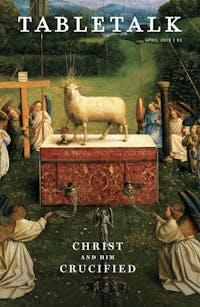
Request your free, three-month trial to Tabletalk magazine. You’ll receive the print issue monthly and gain immediate digital access to decades of archives. This trial is risk-free. No credit card required.
Try Tabletalk NowAlready receive Tabletalk magazine every month?
Verify your email address to gain unlimited access.
Like many Reformed believers, I praise God for His amazing grace, not only for my salvation, but for later bringing me to know the doctrines of grace. I vividly remember when I finally came to see how Scripture taught God’s sovereignty in all things: that I had been born again years before, not by my own decision (John 1:13) but by a God who loves me (Eph. 2:4) and who justified me by grace alone through faith alone in Christ alone (2:8); that He is working out everything according to the purpose of His will (1:11); and that my life and future are held secure in His hands (John 10:28). I even learned to sing with joy: “Amazing love! How can it be, that thou, my God, shouldst die for me?” And yet, for many years I allowed my newfound Reformed faith, and even the cross of Christ, to fuel a heady, sinful spiritual pride. Rather than being humbled and growing in love for others in the body of Christ, I gloried in my theological superiority. It would take many years of the sanctifying work of the Spirit to show me my remaining brokenness and weakness and for the amazing love of my crucified Savior to overflow from my life onto the broken, weak, and wounded all around me.
Scripture clearly confirms what we know to be true by general revelation: that life on this side of glory is marked by weakness. The thorns, thistles, and sweat of the curse (Gen. 3) affect everyone. Even after we have been justified by God’s grace alone through faith alone (Rom. 3:24–25), and even after being saved by the power of the word of the cross (1 Cor. 1:18), we groan inwardly in this body of weakness waiting for the redemption of our bodies (Rom. 8:23). While we wait, however, we need to be equipped to serve and minister in the midst of a fallen world as part of one unified body of the Lord Jesus Christ (Eph. 4:12), who was promised to be “a light for the Gentiles, to open eyes that are blind, to free captives from prison and to release from the dungeon those who sit in darkness” (Isa. 42:6–7).
Unfortunately, it is often our own eyes that need to be opened to what is all around us and the work God calls us to do. Rather than glorying in superior theological knowledge, we are “urged” by the Spirit of God “to encourage the fainthearted, help the weak, be patient with them all” (1 Thess. 5:13). In fact, are not we, who live in the light of the cross, the means by which He reaches the weak? Our marching orders are clear: “For he will deliver the needy who cry out, the afflicted who have no one to help. He will take pity on the weak and the needy and save the needy from death” (Ps. 72:12–13) and “To the weak I became weak, to win the weak” (1 Cor. 9:22).
A turning point in my own life came after I began working among “the weak and needy” in our county jail as a part-time chaplain. Whereas for years I was much like the Ephesian Christians described in Revelation 2 who could quickly identify theological heresy but lacked love, serving in the county jail has opened my eyes to see the practical ways that the finished work of Christ and His powerful Spirit are at work in the most broken, weak, straying, and wounded.
One particular day stands out in my mind when I met with a young man from Central America who had just been arrested on a very serious charge, a charge that could repel “respectable” people and one serious enough to place him on suicide watch. I brought him a Spanish Bible, turned to the parable of the Pharisee and the tax collector (Luke 18:9–14,) and encouraged him read it out loud. With the Bible resting on the bars of his cell door, I watched as tears streamed down his face and soaked the pages of the gospel of Luke. Just like the tax collector, he then cried out from a broken heart, “God, have mercy on me, a sinner!” It was a holy moment, a mighty work of the Spirit of God as a young man went back to his bunk that night justified, and I went home radically affected. I realized anew that before the cross of Christ, that man and I are now a part of the same spiritual body: weak and wounded sinners, without hope and in need of grace. But now, in Christ Jesus, we both “who once were far off have been brought near by the blood of Christ” (Eph. 2:13).

Just last week, a different new believer in the jail sent word that he needed to “confess something” to me. My first thought was that he had some leftover remnants of Roman Catholicism, but when we finally met, he humbly admitted that he had not been honest with me on a particular matter, that he could not sleep until he had asked my forgiveness, and that he wondered if he were even a Christian. What joy filled my heart to see the finished work of Christ and the power of the Spirit evident in this new Christian. I opened the Bible to assure him from the book of Romans how his struggle was the fruit of his justification. He was now living a new life, and this battle in his heart was part of the normal Christian life (Rom. 6–7). I showed him how it was the indwelling work of the Holy Spirit (chap. 8) prompting him to confess his sin. I assured him that I forgave him, and that he should be encouraged in the assurance of his salvation because of the shed blood of Christ (3:24–25), the promise of the gospel (10:13), and the very present powerful, convicting work of the Holy Spirit.
In light of the cross and Christ’s love for me, I am often convicted by the warning to the shepherds of Israel:
The weak you have not strengthened, the sick you have not healed, the injured you have not bound up, the strayed you have not brought back, the lost you have not sought, and with force and harshness you have ruled them. (Ezek. 34:4)
Is compassion for the weak, straying, and needy a common characteristic of our Reformed churches? I pray that it will be in ours, and so I pray regularly for myself, “Lord, open my eyes and soften my heart for every soul you bring across my path—no matter who they are, what they’ve done, or how weak they may be.” This is part of what it means to live in light of the cross.
